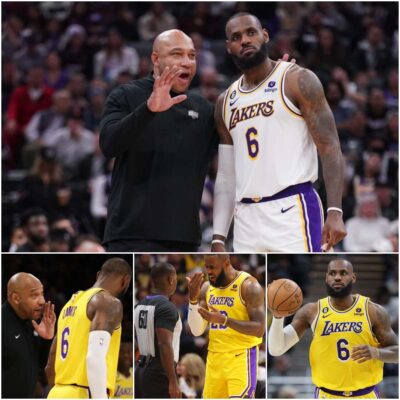The Los Angeles Lakers have taken a step back on defense this season from last year, and as a result, they have had to rely on their center, Anthony Davis, to shoulder much of the defensive load.
Due to their inability to defend the perimeter, NBA insider Mark Medina argues that the Lakers have used Davis as too much of a luxury as they have felt more comfortable taking risks knowing he would likely be there behind them as their ‘defensive anchor’.
But, while it is a ‘nice luxury’ to have, the journalist goes on to argue that it is still very much a work in progress as they seek to find the form they have demonstrated in seasons prior.

Significant defensive drop-off
Fourth-best overall defense post All-Star break last season, this year they rank 15th
The Lakers felt confident coming into the 2023-24 NBA season after having gone on an unlikely post-season run to the Western Conference Finals before getting swept 4-0 by the eventual champions, Denver Nuggets.
Nonetheless, the front-office felt optimistic that the group that was formed at last season’s trade deadline, including the additions of D’Angelo Russell, Jarred Vanderbilt and Rui Hachimura had demonstrated enough potential in the latter stages of the last season, and if they had a full off-season together to spend time and develop chemistry with the rest of the group, then it would put the Lakers in good stead for the 2023-24 campaign.
Now, halfway through the season, the Lakers are still waiting for their continuity experiment to yield success on a consistent basis.
With injuries continuing to plague the roster, with Davis and LeBron James having been two of the Lakers’ healthiest players so far this season, head coach Darvin Ham has struggled to find a consistent rotation, experimenting with 11 different starting lineups, and the starting five that played most of the 2023 post-season together have only played a total of 32 minutes through the first 48 games.
Albeit struggling to score on the offensive side of the ball, where they rank 14th overall in the league in points scored, amounting to only 116.1 points per game, their defensive intensity, which was ranked 4th overall in the league in the 23-game stretch post-All-Star break last season has diminished almost entirely, and the group now currently ranks 15th in the Association for defensive efficiency with a 114.6 defensive rating.
Combined with their offensive rating of 113.4, the 10th-lowest rating in the league, the Lakers are outscored by 1.2 points per 100 possessions, which would partly explain their 9th place standing in the Western Conference, with a breakeven 24-24 record.
Despite this, the Lakers aren’t expected to gamble on their depth in favor of upgrading their roster at the trade deadline, instead, holding the belief that they will get healthy again and only then, will they possibly be able to mount a charge in the second-half of the season. Though, that remains to be seen.
Davis’ defensive load is ‘unfair burden’
Medina argues that Davis’ good defensive numbers, particularly in regard to his blocking numbers, are more of a representation of how much the Lakers have had to rely on their defensive powerhouse as a result of how much they have struggled, as a team, defending both the perimeter and interior.
“It’s put an unfair burden on him in the fact that he’s got such high block numbers, it’s a reflection of AD’s talent, but it’s also a reflection of their poor perimeter defense, and they’ve actually used AD as too much of a luxury, that they can take risks because they know that he can be the defensive anchor.
That’s a nice luxury to have, but they have to improve their point of attack defense, and so that’s a work in progress. I suspect that they’ll be a much better defensive team later on, though.”
Davis keeping Lakers afloat…barely
Only member of Lakers to average more than one block per game
Davis’ offensive production has remained relatively consistent across his 12-year NBA career, currently averaging yet another 20-plus points per game with 24.9 points, while also leading the Lakers on the defensive side of the ball in both rebounds and blocks, grabbing 12.1 rebounds and 2.3 blocks.
The Lakers big is the only member of the team to currently average over a block per game, with the second-leading shot blocker, Christian Wood, averaging only 0.7 per contest. Davis’ block number also ranks as the fifth-best in the league.
Defensively, Davis limits his opponents to only 48.0 percent shooting from the field when he is their primary defender, down from their season average of 49.3 percent for a percentage point differential of minus-1.3 percent.
However, his defensive impact is greater the closer his opponents get to the basket, where from less than six feet away, he holds his opponents to 57.5 percent shooting efficiency, down from their 64.0 percent average, for a percentage point difference of minus-6.4 percent, a mark only Christian Wood betters, minus-7.4 percent, among his teammates to play more than 10 games.
His defensive impact can further be evaluated by his on/off-court rebounding splits, whereby when he is on the court, the Lakers average a team-high 25.5 defensive rebounds off the glass, but when he steps off the court, that number significantly drops to a 10.2 defensive rebounds, a team-low, further emphasizing the need for Davis to be present to work the ball off the glass.
There is no doubt that if the Lakers are to be successful on the defensive end of the ball, then Davis’ presence on-court is paramount, but even with the 30-year-old leading from the front, he lacks the support behind him, whether that be due to injuries or inconsistency in his teammates’ play, for Los Angeles to really mount a charge and turn their defense into offense, and thus into wins.
Therefore, it seems that the only way the Lakers can rise up the standings and into a position where they can, at least, fight for a place in the post-season, via the Play-In tournament, is if the team can develop some consistency around Davis, who has arguably been their most reliable performer, alongside superstar teammate James. But, they simply can’t do it all alone.











